news & notes
Table of Contents
- New education and research building unveiled; honorary degree awarded to WHO Director-General
- ‘We need you now more than ever’ Gov. Maura Healey tells UMass Chan grads at Commencement
- UMass Chan, MITRE launch Health AI Assurance Laboratory with MassTech grant
- Summer Undergraduate Research Program celebrates 35 years
- UMass Chan grant establishes psychiatric mental health nurse practitioners fellowship
- UMass Chan, Lahey partner on research science hub
- Trip to the moon for story of boy with ultra-rare disorder being studied at UMass Chan
New education and research building unveiled; honorary degree awarded to WHO Director-General

Proclaiming that the next generation of medical advances could arise from research conducted in its labs, offering hope to people around the world, leaders from near and far celebrated the ribbon cutting for UMass Chan Medical School’s new education and research building on June 7.
The 350,000-square-foot building will be home to more than 70 principal investigators, focused on gene therapy, the neurosciences and molecular medicine. The building, which also provides space for UMass Chan to train more future physicians, nurse leaders and scientists, is designed to achieve LEED Gold certification for energy efficiency and sustainability.
“Today’s ceremonial ribbon cutting heralds the start of a new, dynamic chapter in UMass Chan’s unfolding narrative; one where we will witness a convergence of hope and expectation; aspiration and realization; intent and impact,” said Chancellor Michael F. Collins. “The opening of the new education and research building represents a substantial down payment in furtherance of our institutional commitment to change the course of the history of disease—in Worcester, for the world.”
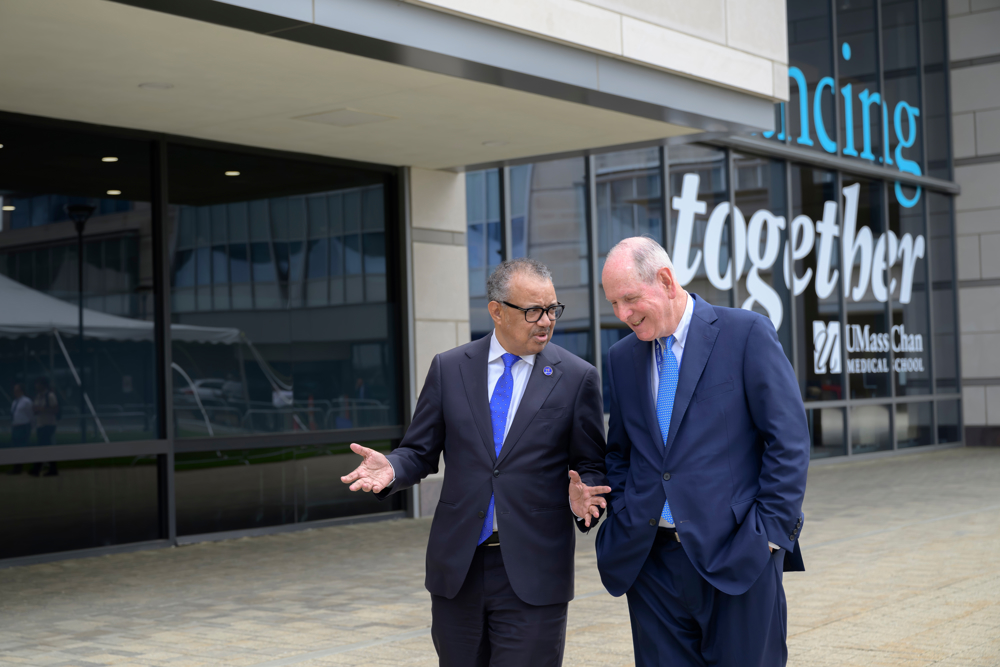
World Health Organization Director-General Tedros Adhanom Ghebreyesus, PhD, was presented with an honorary Doctor of Science degree by Chancellor Collins and delivered the keynote address. Dr. Tedros, as he is known, is globally recognized as a health scholar, advocate and diplomat with first- hand experience in research, operations and leadership in emergency responses.
“Although the building is new, its twin purposes—education and research—are not. They have always been central to the mission of this school, just as they have always been . . . to our work at the WHO.”
Tedros is the first WHO director- general from the WHO African region. After taking office as leader of WHO in 2017, he has focused the organization on supporting countries in three key areas: promoting health and preventing disease; progressing toward universal health coverage; and preparing for, preventing and responding effectively to health emergencies.
“Although the building is new, its twin purposes—education and research—are not,” Tedros said. “They have always been central to the mission of this school, just as they have always been central to improvements in health globally, and to our work at the World Health Organization.”
Tedros spoke to UMass Chan’s emphasis on primary care as the essential foundation of any health system and lauded UMass Chan’s impressive track record in research, including the Nobel Prize-winning research on RNA interference that “has opened the door to new treatments against many diseases.” Other dignitaries who spoke at the program included Mary L. Burns, vice chair of the University of Massachusetts Board of Trustees and chair of the UMass Building Authority Board of Directors; U.S. Rep. Jim McGovern; Massachusetts Sen. Robyn Kennedy; and Worcester Mayor Joseph Petty.
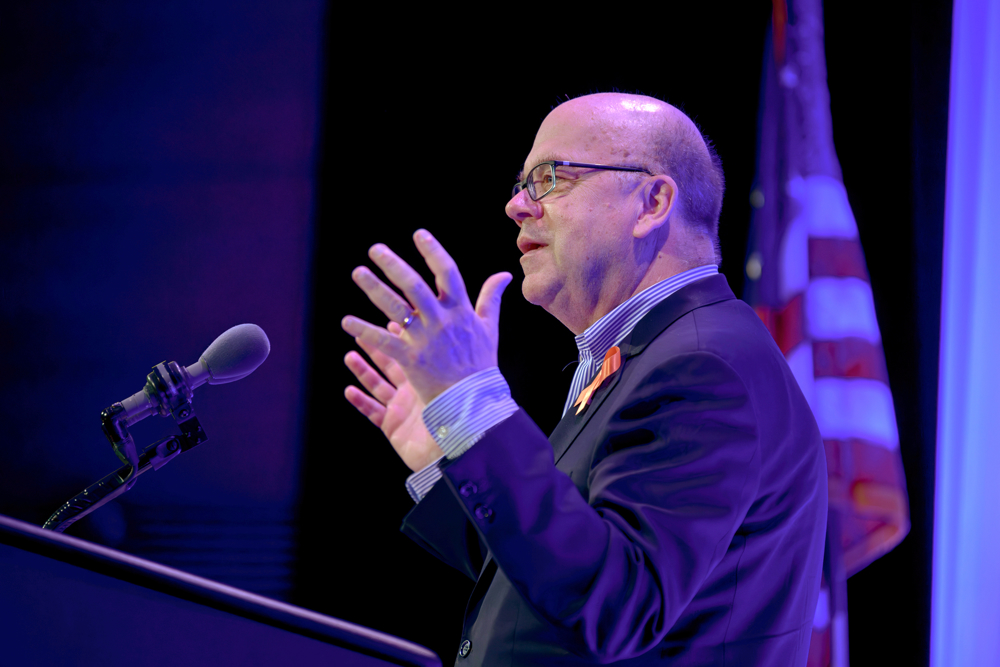
‘We need you now more than ever’ Gov. Maura Healey tells UMass Chan grads at Commencement
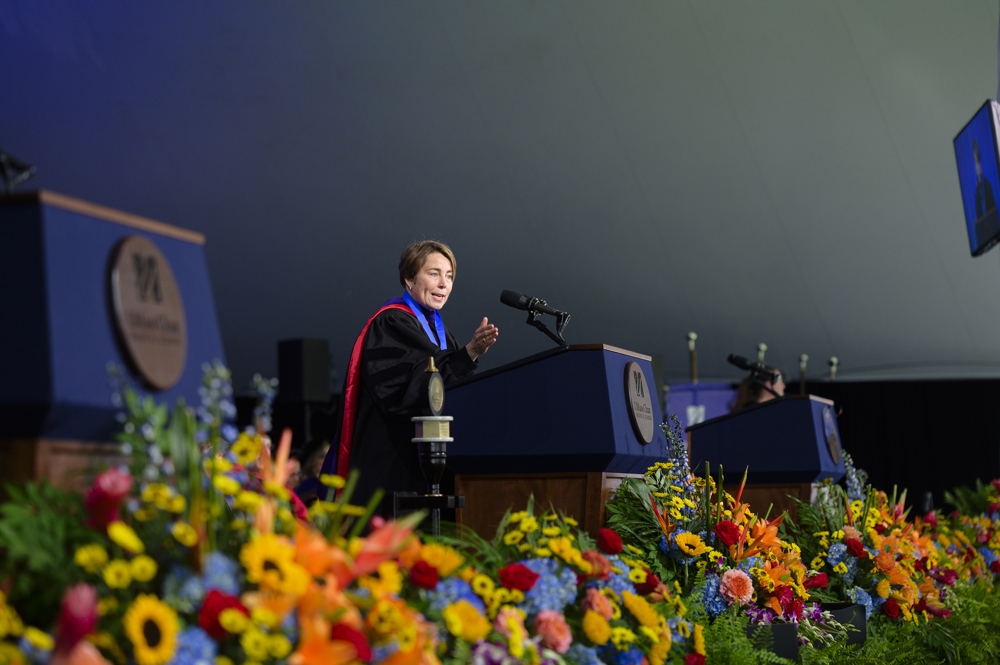
UMass Chan Medical School welcomed family, friends, alumni and faculty on June 2 to its 51st Commencement, celebrating the Classes of 2024 from the Tan Chingfen Graduate School of Nursing, the Morningside Graduate School of Biomedical Sciences and the T.H. Chan School of Medicine.
The ceremony was celebrated on the campus green, now in the shadow of the 350,000-square- foot, new education and research building, which sits between the Aaron Lazare Research Building and the Albert Sherman Center that opened June 7.
Gov. Maura Healey was presented with a Chancellor’s Medal and delivered the Commencement address. Healey, the 73rd governor of Massachusetts, was elected in 2022 and is the first woman and first LGBTQ+ person to be elected to the position.
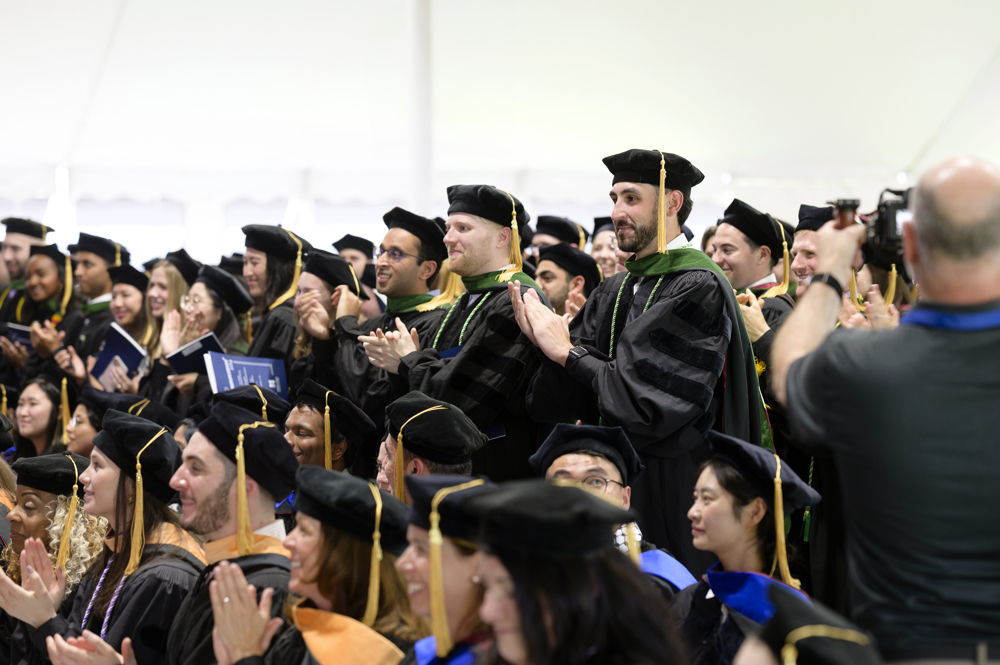
Healey spoke to the graduates about the challenges they will likely face in their professions moving forward, including financial challenges faced by hospitals and health centers; workforce shortages for physicians, nurses, clinical supervisors and licensed clinicians; and mental stress and burnout. Despite the challenges, Healey said the graduates inspire optimism for Massachusetts residents and people all over the world.
“We need you now more than ever. This is a critical time for graduates and for the future of health care. It’s a moment of great challenges, but it’s also a moment of great hope,” Healey said. “It’s not an easy time to enter the health care field, but it is a time when you can make a real and lasting difference.”
“I want you all to be the ones whose ideas will be heard and to bring the energy for change. Opportunities abound and we need your skilled hands, your caring hearts, your brilliant minds and your growing leadership,” Healey continued.
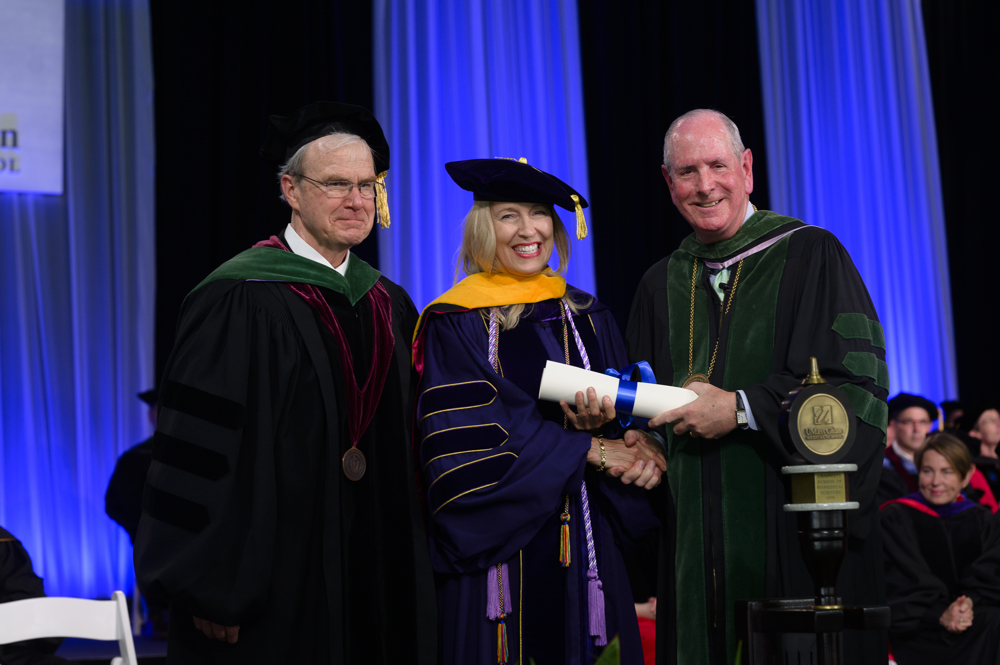
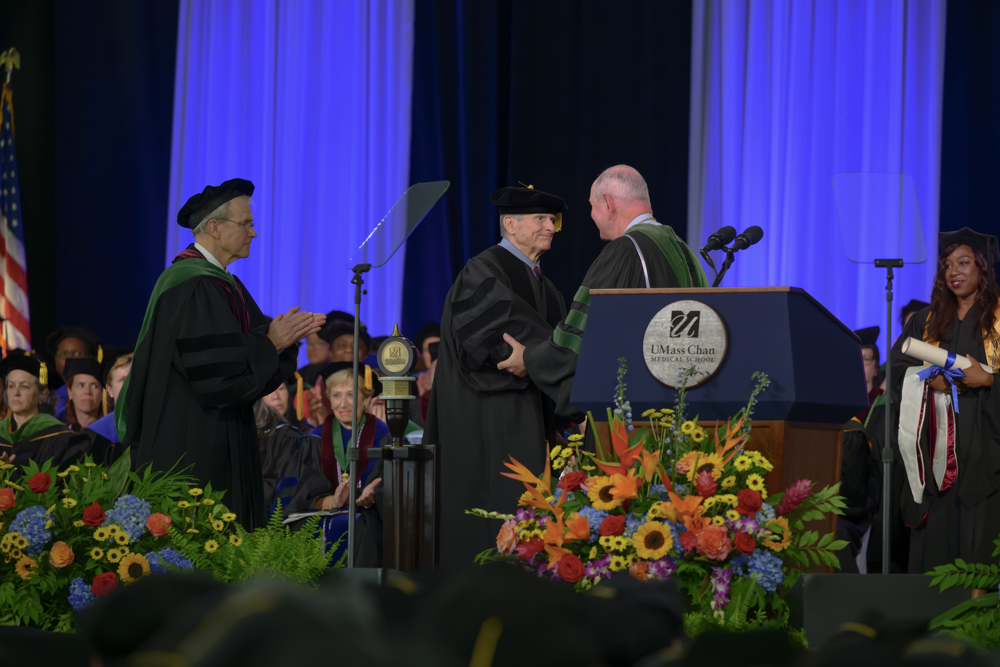
“We need you now more than ever. This is a critical time for graduates and for the future of health care. It’s a moment of great challenges, but it’s also a moment of great hope.”
Honorary degrees were awarded to Ann Kurth, PhD, RN, MPH, president of the New York Academy of Medicine, and Frederick “Rick” Sontag, MS, MBA, co-founder and president of the Sontag Foundation, the Spring-Bay Companies and the Brain Tumor Network.
Chancellor Michael F. Collins presided over the awarding of 167 Doctor of Medicine degrees, eight MD/PhD degrees, 29 Doctor of Philosophy degrees, five Master of Science in Clinical Investigation degrees, 56 Doctor of Nursing Practice degrees, five Master of Science in nursing and interprofessional leadership, three PhD in Nursing degrees, and three postgraduate certificates.
Chancellor Collins said, “I am confident that this group of graduates shall be the bright hope for professions that are saddled with complexity, bureaucracy and resource inadequacies, all of which are daunting the promise of tomorrow.”
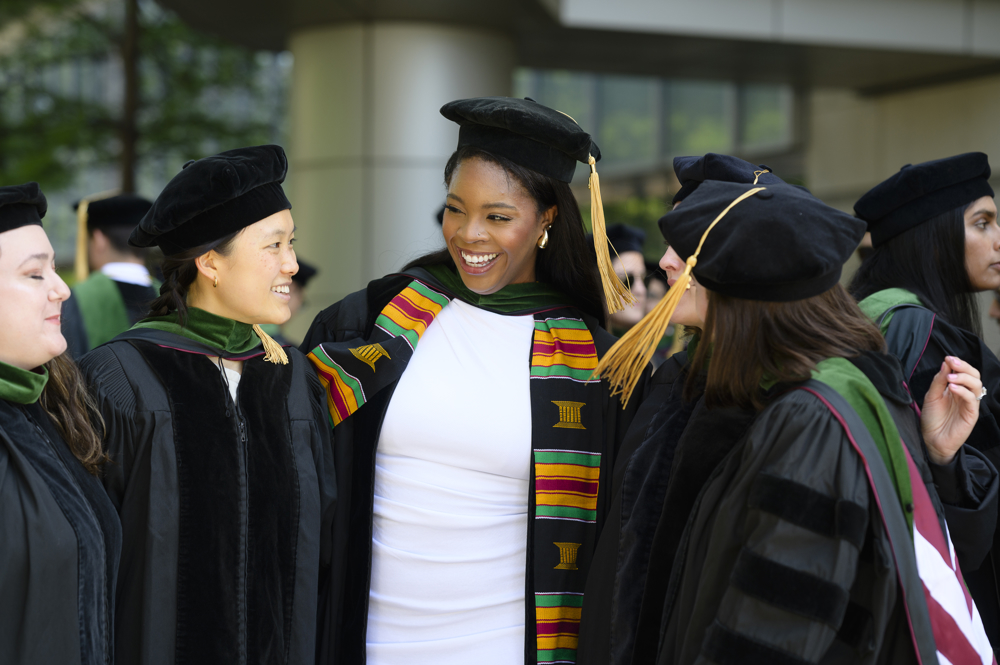
UMass Chan and MITRE launch Health AI Assurance Laboratory with MassTech grant

UMass Chan Medical School and MITRE, an operator of federally funded research and development centers, announced the establishment of the Health AI Assurance Laboratory, a collaborative initiative to advance health artificial intelligence in the public interest. The initiative is at the forefront of efforts in the United States—and the first in Massachusetts—to ensure AI technology in health care is safe and effective for everyone using it.
At the announcement at UMass Chan in April, Yvonne Hao, secretary of the Massachusetts Executive Office of Economic Development, presented an award for $555,000 from the Innovation Institute at the Massachusetts Technology Collaborative (MassTech) as part of its Technology & Innovation Ecosystem Awards Program. The Health AI Assurance Laboratory will also receive $137,000 in matching private investment.
“We are committed to researching and developing health AI tools to strengthen our state’s leadership in health care,” said Secretary Hao, who is also co-chair of the state’s Artificial Intelligence Strategic Task Force. “The new Health AI Assurance Laboratory is an incredible opportunity to grow the AI ecosystem by building strategic partnerships and providing career opportunities to students in data analysis, informatics and machine learning. Through the leadership of the researchers at UMass Chan and MITRE, this new lab will help us build a stronger health AI industry in Massachusetts and accelerate responsible innovation for the global marketplace.”
“UMass Chan, a national leader in biomedical research, continues to make great strides to change the course of the history of disease,” said Chancellor Michael F. Collins. “Together with MITRE and with support from the Innovation Institute at MassTech, current and future health care professionals will be able to create and guide AI technology to fulfill its promise of better, more efficient and more equitable patient care across our communities.”
The Health AI Assurance Laboratory team is led by Program in Digital Medicine founder David McManus, MD'02, MSc'12, the Richard M. Haidack Professor of Medicine, chair and professor of medicine; Adrian Zai, MD, PhD, MPH, associate professor of population & quantitative health sciences; and Miles Thompson, AI assurance solutions lead at MITRE.
Summer Undergraduate Research Program celebrates 35 years

For the 35th year, undergraduate college students traditionally underrepresented in medicine and biomedical research from across the country spent time doing research and receiving mentorship from faculty at UMass Chan Medical School’s Morningside Graduate School of Biomedical Sciences.
Every summer, about 30 college juniors and seniors are selected from hundreds of applicants to spend 10 weeks on campus, working side by side with postdoctoral researchers and renowned scientists, networking and learning in depth about biomedical research careers.
The program was co-founded in 1989 by Deborah Harmon Hines, PhD, professor emeritus of radiology and nursing, and former vice provost for school services. Since 1993, the program has been funded by the National Institutes of Health, with additional funding from the Office of Research and the UMass Chan Provost’s Office Summer Undergraduate Research Experience. It is sponsored by the UMass Chan Office of Outreach Programs.
“What distinguishes this program from many others is there is a lot of structure,” said co-principal investigator Brian Lewis, PhD, the George F. Booth Chair in the Basic Sciences and professor of molecular, cell & cancer biology. “The students get opportunities for fantastic research. But we also do professional development activities with them, such as navigating professional relationships, mentoring and the ‘hidden rules’—simple things such as if someone sends you an email, you might want to respond.”
“The students get opportunities for fantastic research. But we also do professional development activities with them, such as navigating professional relationships.”
Since the NIH began funding the program, 753 aspiring scientists have participated, with about half of them going on to pursue graduate education in medicine, biomedical science or related health professions. Among those, 34 have received degrees from UMass Chan and nine are currently enrolled.
Pranoti Mandrekar, PhD, professor of medicine and co-principal investigator, said that having a drive to understand is crucial for admission to the program and for becoming a scientist. “My personal experience as a mentor has been very positive and fulfilling,” she said. “I learn a lot from the students as well.”
Linhelle Charles serves as the program’s administrative coordinator and maintains connections with alumni through social media and email, staying updated on professional news, weddings, births and other life events.
“It’s important to have a relationship with them because part of the program is to be able to network and get the advising that they need for their next journey,” said Charles.
New UMass Chan grant establishes psychiatric mental health nurse practitioners fellowship

The Tan Chingfen Graduate School of Nursing at UMass Chan Medical School is implementing a new statewide fellowship program to expand the pipeline of psychiatric mental health nurse practitioners entering the community health center workforce.
The Massachusetts Executive Office of Health and Human Services awarded a four-year, $11.6 million grant to the Tan Chingfen Graduate School of Nursing, with funding received from the U.S. Department of the Treasury’s Fiscal Recovery Fund to create the fellowship; address the increasing demand for psychiatric and mental health services in the state; help close workforce gaps; and resume new staff training, teaching and licensing in the state’s health and human services that were disrupted by the COVID-19 pandemic.
“We’re trying to build capacity within community health centers for psychiatric mental health nurse practitioners,” said Mechelle Plasse, PhD, APRN, assistant professor of nursing and director of mental health nursing programs. “We can integrate specialized nurse practitioners into health center teams to increase access to general health care and psychiatric mental health care at the community level.”
There are more than 200 licensed community health and hospital centers in Massachusetts providing care to more than 1 million patients, a large majority of whom are low income and come from historically underserved populations. The goal of the fellowship program is to recruit and place at least one graduate-level fellow and two student fellows in at least 25 community health centers over a four-year period.
UMass Chan and Lahey partner on new clinical and quantitative research science hub
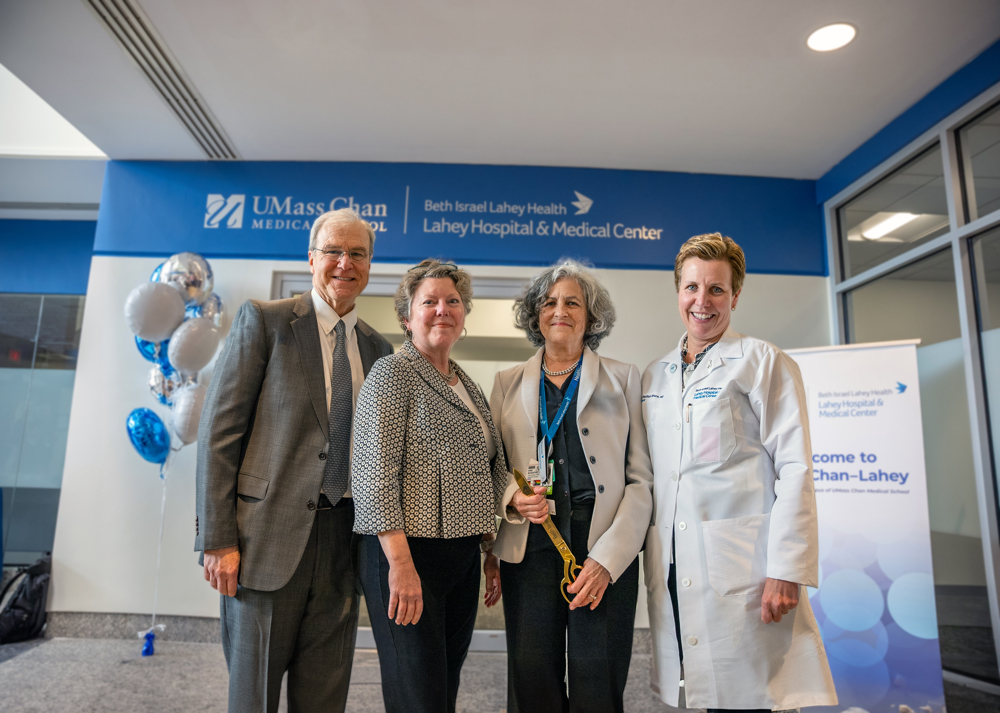
UMass Chan Medical School and Lahey Hospital & Medical Center, part of the Beth Israel Lahey Health system, have signed a research affiliation agreement to create a new quantitative science research hub to improve health outcomes and disparities through population health, digital medicine and health systems science. The research agreement allows the institutions to study clinical data and collaborate on research, and builds on the partnership formed with the establishment of the UMass Chan- Lahey regional campus, which was approved by the Liaison Committee on Medical Education in May 2023 and received accreditation from the New England Commission of Higher Education in January.
“The Medical School’s partnership with Lahey will offer clinical and population scientists, faculty and medical students the opportunity to leverage the expertise and clinical data of both institutions to more deeply engage in innovative research that addresses the health care needs of the regional campus and its surrounding community,” said Terence R. Flotte, MD, the Celia and Isaac Haidak Professor, executive deputy chancellor, provost and dean of the T.H. Chan School of Medicine.
“The Medical School’s partnership with Lahey will offer clinical and population scientists, faculty and medical students the opportunity to leverage the expertise and clinical data of both institutions to more deeply engage in innovative research.”
As part of the research agreement, Lahey will create the Institute for Healthcare Delivery Science to foster innovation in digital medicine, population health and health care delivery. The institutions will establish a research informatics core for sharing and analyzing de-identified data. UMass Chan-Lahey faculty and students will also have access to UMass Chan’s extensive research infrastructure, core technologies and other resources.
“The newly formed Lahey Institute for Healthcare Delivery Science will be a critical driver of our learning health system, advancing high quality clinical care, population health, digital medicine and implementation of clinical discoveries,” said Anne Mosenthal, MD, Lahey Hospital & Medical Center’s chief academic officer, and regional executive dean of UMass Chan-Lahey.
Additionally, with the agreement, Lahey becomes a full partner in the UMass Chan Center for Clinical and Translational Science, which is funded through the National Institutes of Health’s National Center for Advancing Translational Sciences.
Trip to the moon for story of boy with ultra-rare UBA5 disorder being studied at UMass Chan
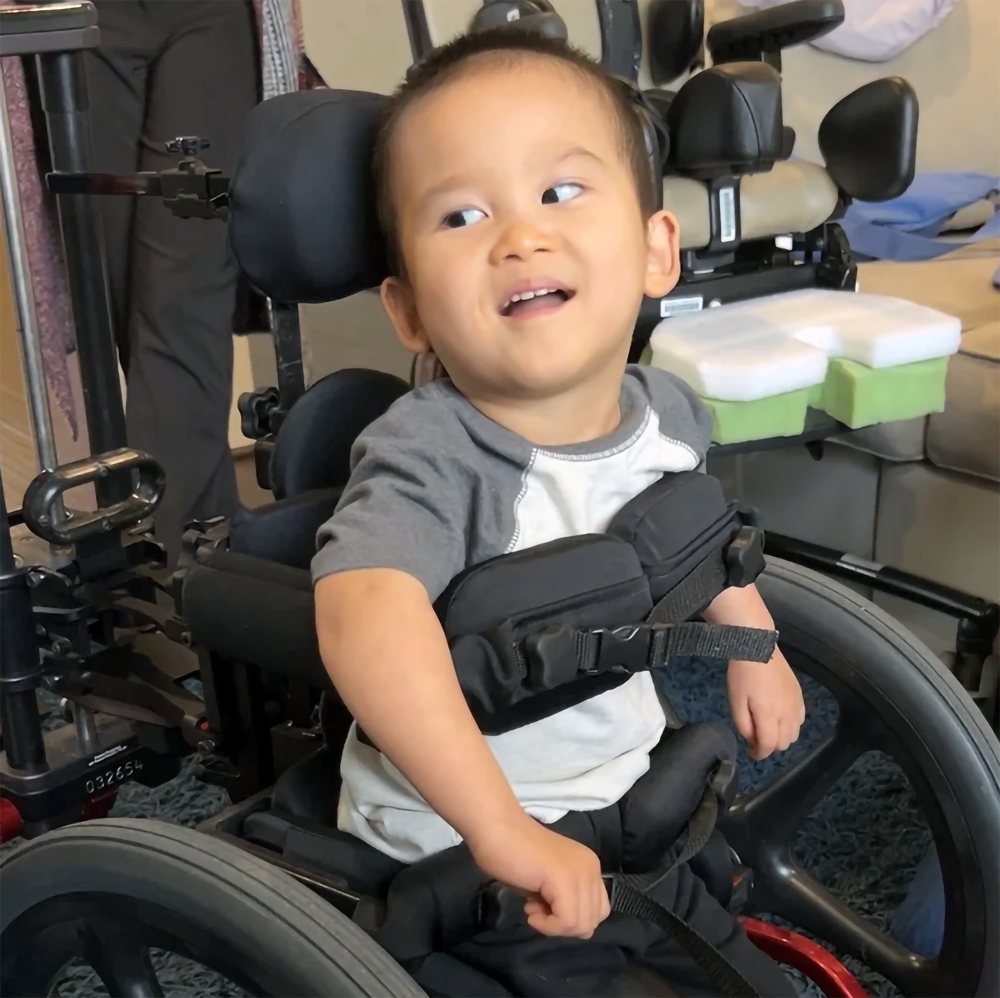
Parents of children with rare diseases go to extraordinary lengths to raise funds and awareness for research that might lead to an effective treatment or cure. Now, the story of 4-year-old Raiden Pham has been to the moon. He has an ultra-rare neurodegenerative disease, known as UBA5 disorder, that UMass Chan Medical School researchers are studying.
The story of Raiden’s journey is included on an indestructible digital time capsule of art, music, film and history, as part of the Lunaprise Moon Museum Mission, which was onboard the Odysseus spacecraft that landed on the moon in February.
“When we think about gene therapy, or any kind of cure or treatment for these rare diseases, it’s always considered a moonshot, but that’s not the case anymore,” said Tommy Pham, Raiden’s father.
The Raiden Science Foundation, founded by Tommy and Linda Pham in 2021, has raised $1 million of its $4 million goal, which supports research in UMass Chan’s Translational Institute for Molecular Therapeutics and other partner institutions.
The research on UBA5 is led by Toloo Taghian, PhD, instructor in radiology in the lab of Heather Gray-Edwards, DVM, PhD, assistant professor of radiology. Dr. Taghian has identified the top two viral vector constructs for UBA5 expression in- vivo, which show great promise in successfully delivering UBA5 gene therapy to the targeted cells. ■